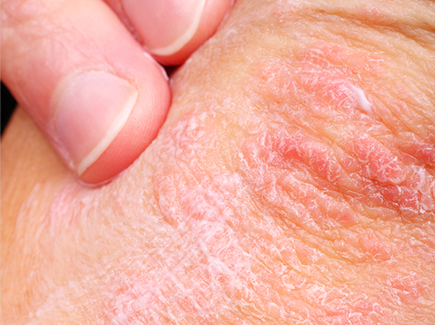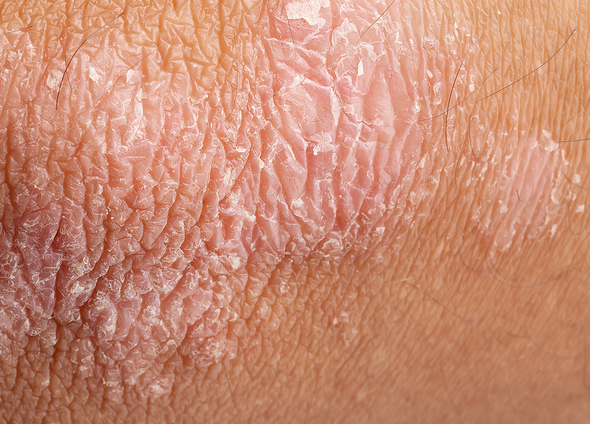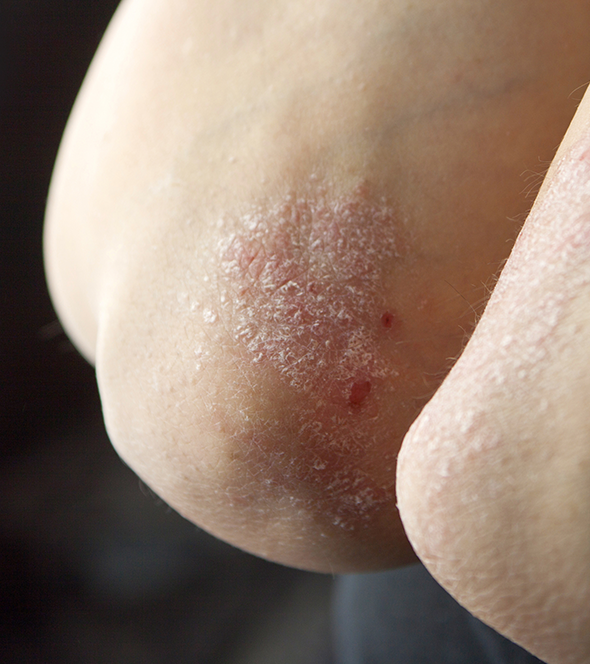Advanced Psoriasis Treatment
Psoriasis causes the body to produce new skin cells too quickly. This buildup creates thick, red, scaly patches that can itch, burn, or crack.
While psoriasis is not contagious, it can be physically uncomfortable and emotionally distressing, especially if symptoms persist without relief.
At Advanced Dermatology, P.C., we provide personalized psoriasis treatment plans tailored to your skin type, symptoms, and condition severity.

Whether you’re dealing with mild flare-ups or long-term challenges, our board-certified dermatologists help you manage triggers, improve your skin health, and feel more confident.
To learn more about what causes psoriasis, how it’s diagnosed, and which treatment options may be right for you, continue reading below or contact our team.

What Is Psoriasis?
Psoriasis is a dermatological condition caused by an autoimmune disorder that speeds up the skin’s natural life cycle.
Instead of gradually shedding old skin cells, the body builds them up on the surface in just a few days. This overproduction leads to raised, red, flaky patches covered with silvery-white scales.
If you ask, “What does psoriasis look like?” the answer can vary. Psoriasis may appear as dry patches on the scalp, elbows, knees, or lower back, or as small drop-like lesions after an illness.
While symptoms and severity differ, the root cause of psoriasis is the same: an overactive immune system.
Signs and Symptoms of Psoriasis
Are you wondering how to know if you have psoriasis? The condition presents in different ways depending on the type and severity.
Common psoriasis symptoms include:
- Red or pink plaques with silvery-white scales.
- Itching, burning, or stinging sensations.
- Cracked, bleeding, or flaking skin.
- Nail pitting or thickening.
- Stiff, swollen joints (in cases of psoriatic arthritis).
Symptoms can appear anywhere but are most common on the scalp, elbows, knees, lower back, and skin folds.
What Causes Psoriasis?
There’s no single cause of psoriasis, but a combination of genetic and environmental factors contributes to the condition.
Your immune system mistakenly attacks healthy skin cells, triggering inflammation and rapid cell turnover.
Common psoriasis triggers include:
- Stress.
- Illness or infection (especially strep throat).
- Cold or dry weather.
- Skin injuries (cuts, scrapes, or sunburn).
- Alcohol use.
- Hormonal changes.
- Certain medications (such as beta-blockers or lithium).
Understanding your psoriasis causes and triggers can help reduce the frequency and severity of flare-ups.
Types of Psoriasis
There are several recognized types of psoriasis, each with unique symptoms and locations.
Our dermatologists specialize in identifying your specific type to create the most effective treatment plan.
Common types include:
- Plaque Psoriasis: The most common type, with raised, scaly, red patches.
- Scalp Psoriasis: Causes flaking, redness, and irritation along the hairline or entire scalp.
- Guttate Psoriasis: Small, red spots often triggered by infections.
- Pustular Psoriasis: White pustules surrounded by inflamed skin, typically on hands and feet.
- Inverse Psoriasis: Smooth, red lesions in body folds like the groin or underarms.
- Erythrodermic Psoriasis: A rare and severe form causing widespread redness and scaling.
- Nail Psoriasis: Affects nail appearance, thickness, and structure.
- Psoriatic Arthritis: Joint pain and stiffness that may occur alongside skin symptoms.
- Sebopsoriasis: A mix of psoriasis and seborrheic dermatitis, often found on the scalp, face, and chest.


How Is Psoriasis Diagnosed?
A psoriasis diagnosis starts with a detailed medical dermatology evaluation, including a skin exam and a review of your medical history, visible skin changes, symptom patterns, and any family history of autoimmune conditions.
Your dermatologist may perform a skin biopsy to confirm the diagnosis and rule out similar-looking conditions such as eczema, fungal infections, or lupus.
Psoriasis Treatment Options
There’s no cure for psoriasis, but many treatment options can reduce symptoms and improve your quality of life. The right approach depends on the severity, type, and how your skin responds to previous therapies.

For Mild Psoriasis (less than 10% body coverage), treatment includes:
- Topical corticosteroids to reduce inflammation.
- Vitamin D analog creams to slow cell growth.
- Moisturizers to reduce flaking and dryness.
- Scalp treatments including medicated shampoos or steroid foams.
For Moderate to Severe Psoriasis, treatment options may include:
- Phototherapy (light therapy) using controlled UV exposure.
- Systemic medications, either oral or injectable.
- Biologics that target immune system proteins.
- Combination therapy for stubborn or widespread symptoms.
- Laser treatments for resistant plaques.
- Steroid injections for small, persistent areas.
Your dermatologist will guide you through the best options based on your health history, goals, and lifestyle.
Get Expert Psoriasis Care at Advanced Dermatology, P.C.
At Advanced Dermatology, P.C., we understand how frustrating living with chronic skin conditions like psoriasis can be.
Our board-certified dermatologists provide expert diagnosis and psoriasis treatment using the latest advances in medical and cosmetic dermatology care.
We’ll help you manage symptoms, reduce flare-ups, and improve your skin health so you can feel more comfortable and confident in your skin. Book an appointment to get started.
